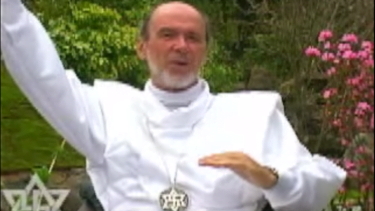This article originally appeared in The Skeptic, Volume 15, Issue 2, from 2002.
To quote the broadcaster, Terry Wogan: “Is it me?” or is the world just going mad? I am an inveterate listener to BBC Radio 4, especially the flagship Today programme. In particular, I am always interested to hear scientific topics being addressed by John Humphrys, Sue MacGregor, and the rest of the crew (despite the occasional inanity of the questions) and it is always good to hear my fellow scientists doing a good job of explaining their interests to 6 million radio listeners. And so, as the redoubtable John Humphrys introduced an item on cloning a couple of weeks ago, I was wondering which academic expert the Today programme researchers would have selected to discuss this scientifically – and ethically – challenging topic. Professor Steve Jones perhaps? Or that standard fallback “our science correspondant, Pallab Ghosh”. No, neither of the above – instead the chosen expert was… Rael.

Who? Well let me give you a bit of biographical background on the BBC’s chosen expert on human cloning. In December 1973, French motor racing journalist, Claude Vorilhon was driving through the extinct volcanoes of the Massif Central near Clermont-Ferrand when he happened upon a landed UFO and a group of friendly aliens with whom he engaged in conversation (as one does). It transpired that these friendly, scientifically and spiritually advanced folk were eager to get in contact with mankind but had been waiting for the right French freelance journalist to come along. What they needed, you see, was someone to set up a terrestrial embassy through which they could easily make contact with mankind on a regular basis without favouring any particular nation, culture or creed.
By the way, it is not clear to me what the Aetherius Society had, or have, to say about this, as their founder, taxi-driver – and later Prince and Archbishop – George King, was declared to be Earth’s voice on the Interplanetary Parliament back in May 1954.
But continuing with M. Vorilhon’s story – the aliens, known as the Elohim, wished to help mankind create “a world of leisure, creativity and fulfilment, free from the burden of money and the need to work . . .” They certainly helped our journalist friend achieve these latter two objectives by getting him to change his name to Rael and to found the Raelian religion to which members donate a goodly chunk of their income.

A major objective of the Raelian movement is to obtain the funding and an appropriate piece of real estate near Jerusalem (on the Gaza strip maybe?) to enable the construction of Earth’s intergalactic embassy. The Elohim have kindly provided a detailed specification for the embassy building which should be constructed in the middle of a park and should include (amongst other things) a swimming pool and a dining room capable of seating 21 people. The grounds surrounding the embassy (minimum 1050 metres in radius) must have the status of an “extra-territoriality” – a bit like the Vatican – and the Elohim must, of course, have free transit rights through the airspace above it.
But what on Earth (or elsewhere) has this got to do with human cloning? Well, the connection is that rather than being the products of Darwinian evolution, we (i.e. the human race) were manufactured in a test tube by the Elohim many millennia ago. Primitive man then understandably regarded our lab-coated creators as gods and – superstitious people that they were – worshipped them and founded the many different world religions, the better to extol their glory. Now that we have entered the 21st century, however, and are capable of creating life in test tubes ourselves, the time has come to abandon our mantle of superstitious religious belief and get back in contact with our creators, through the good auspices of Rael. And given the fact that he is the recipient of the Elohim’s advanced and ever so ancient knowledge of the creation of life – the very knowledge that gave rise to the creation of mankind itself – who better could the BBC consult as an expert on human cloning?
When I met Rael on a Central TV programme many years ago, he was dressed entirely in white, was relaxed and smiling and was surrounded by a number of adoring, attractive young women half his age. I was feeling rather irate at the idea that anyone could possibly take this nonsense seriously and one of Rael’s vestal virgins shouted at me “Are you happy? You don’t look happy! But we’re happy!”.
Thinking about it, with the prospect of soon having a beautiful embassy building somewhere warm (with swimming pool and dining room for 21 people), being surrounded by adoring young twenty-somethings and never having to work again – and now being a scientific expert to the BBC on human cloning, I suspect that Claude Vorilhon made a better career decision in December 1973 than I have ever made.



